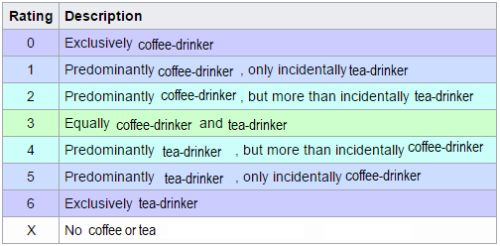I Used To Be A 6 But Now I’m A 2
I used to be a 6 but now I’m a 2

new kinsey scale just dropped tag yourself
I used to be a 5 but now I’m a 3
More Posts from Lyliana1277 and Others
@todaysbird










Look at these birbs
Random pieces of advice
The world is less scary and chaotic if you lie down on the floor
Noticing different kinds of light (stars, candles, sunshine or city lights) can bring back the feeling of wonder and hope
If you can’t shower, washing your hands and face will help you feel better and cleaner
If you can’t clean anything else, changing and/or washing your bedsheets can do wonders
Fresh air and being outside in general can help with depersonalisation
Spending time around animals can help you recognise what’s important and calm anxious thought cycles
Techniques for emotional regulation in children can really help adults too
Putting random asortment of food on a plate without creating an actual dish still counts as a meal
Drink something warm
Delete that app
Treat yourself as if you were a kid. Buy yourself a toy, play around, learn about cool new things
Fast paced life isn’t morally better and it’s not good for everyone
There is no good reason to keep yourself hungry
Singing to your full lung capacity can be a great way to let out built up emotion
Tension in the face can cause headaches. Try to massage your face regularly
Nothing is as important as your health
You are a whole person on your own, you don’t need someone else to be there to deserve love and attention. Your life can be full as long as you are present
You should cry things out whenever you feel like it
Slow walks are still movement and they do count
It’s never as bad as you imagine it
Try changing your toothpaste flavor if you hate brushing your teeth
Anything can be a stim toy - one of my favourites is a heavy dragon necklace that has a complicated surfice. It’s fun to touch and hold and it’s not even “actual” stim toy
Procrastinating and feeling bad about it is true waste of time. Learn to truly rest. It takes the same amount of time but it is useful
Sometimes you have to force yourself to do the things that make you feel better
Don’t trust the thoughts you have after not sleeping for a while
Friendships don’t have to be forever to mean something
We’ve taught our children this and it’s amazing to watch them grow into emotionally healthy people.
Can we normalize asking children if we can hug them?
Children deserve a right to make decisions about this sort of thing. Forcing children to hug or kiss relatives they don’t want to can not only be upsetting, but also teaches them that they should do things they’re not comfortable with to not hurt someone’s feelings. I don’t think I have to spell out why that’s a problem.
Teaching children about this is good for their emotional well being but also teaches them about consent both giving and receiving it.
If you meet someone with chronic pain and you think, "wow, they're so chill, I didn't even realize they were in pain"--please know that within me lives the rage of every war god.
“The average US president has been charged with 1.54 felonies” factoid isn’t true. The average US President has been charged with 0 felonies. Donald trump, who has been charged with 71, is a statistical outlier and should not have been counted
The beginner autistic guide to common terms in our community (with extra context!).
*Disclaimer, I’m not a professional. This is just knowledge from my experience as an autistic person. Please feel free to correct anything :)
These definitions will include some of my own opinions and thoughts, especially on the more controversial terms. This is simply to help better prepare new autistic community members for conversations they become engaged in. Having all the perspective and context you can have can be very helpful when moving into new social spaces.
Autism (Or Autistic Spectrum Disorder, ASD): A neurodevelopmental disorder that is present from very early childhood. It’s mostly recognised through difficulties with social interaction and restricted and/or repetitive behaviours. The way it is referred to as “Autism Spectrum Disorder” is specifically referring to the fact that autism presents in countless ways. There are common traits and patterns, but the severity and complexity of those traits and symptoms is infinite.
NOTE: This does not mean that ‘everyone is a little bit autistic’. You are either autistic or you are not. It just means that if you have autism, it may present very differently to other autistic people you know.
Asperger’s Syndrome: Asperger’s syndrome is usually considered an older term for a ‘subtype’ of autism. The term is considered outdated by the DSM-5 and no longer used in that document. However it is still used in a lot of other countries. Now it is becoming more socially known that ‘Asperger’s syndrome’ is just a specific presentation of autism. Many autistics don’t like the use of the word ‘Asperger’s’ because of a couple reasons:
The term has a long history with NAZI’s and eugenics.
The term seems to basically mean ‘high functioning’ autistic, which simplifies the condition.
Asperger’s Syndrome is defined in a very similar way to autism, however people with “Asperger’s’ may be described as ‘gifted’ or ‘intellectual’.
It’s important to note that many people still identify themselves with the term ‘Asperger’s’. While it is good to be educated and up to date with terminology, some people have identified with this term their whole life and it’s not wrong to use the term for one-self. But either way, I do encourage you to do more research if you are comfortable.
Neurotype: Can be basically defined as the type of brain function one has. Some people consider autism a neurotype, and then neurotypical as another neurotype. However, many people claim that autism is ‘just another neurotype’. This is a harmful way of thinking about autism because autism is a disability. Labelling it as a ‘neurotype’ belittles all the struggles autistic people have that make them disabled. Autism is a spectrum and so some autistic people may not really consider themselves disabled, but many do.
Neurotypical (NT): A non-autistic person with no other mental conditions.
Allistic: A non-autistic person who can still have other mental conditions, such as depression or ADHD.
Neurodivergent (ND): Traditionally ‘Neurodivergent’ has been used to mean either autistic or ADHD. However in some contexts it is used to mean someone with any mental condition, including personality disorders or mental illnesses such as depression and anxiety.
Neurodiversity: a term used to describe the fact that there are many neurotypes in the world. It is used to imply that differences in brain development and function should be accepted as relatively normal. I think this is a good sentiment, but that some neurotypes should still be considered disabilities as well as a neurotype, so as not to diminish the struggles specific neurotypes go through.
High functioning/Low functioning: The labels of functioning are terms used to describe how independent an autistic (or other kind of disabled) person is able to be. Many autistics do NOT like the use of these terms for a couple reasons:
It tends to focus on the way an autistics disability affects the allistic people around them.
It simplifies the experience of the individual with autism to how independent they are, and is also not very descriptive for anyone trying to help the said autistic person.
High needs/Low needs: These are labels used to describe how much assistance an autistic (or other kind of disabled) person may need. It is slightly preferred by autistic people as the language is more centred to what the autistic person needs, rather than how independent they can be.
NOTE, many autistic people would argue that these terms are basically the same as high functioning and low functioning. I personally consider it to be best to just state someones highest needs or difficulties. For example “Olivia is nonverbal and highly sensitive to light and noise.”.
Masking: Masking is the act of hiding ones autistic traits to appear to be neurotypical. Masking is often a survival strategy developed by autistics to evade bullying or isolation. Masking can include suppressing the urge to stim, forcing oneself to make eye contact, learning how to ‘properly’ execute facial expressions, studying body language, etc. Masking can be an extremely vital skill for autistic people, but when an autistic person has to mask for long periods of time it can lead to negative consequences such as burn out or meltdowns. Masking can also be used in the context of other disabilities, such as ADHD.
Scripting: Scripting is a form of masking, when an autistic person pre-plans or practices responses or entire conversations. You may have a script you unconsciously follow for questions like “how are you?” Or “how is work?”, etc. It may be inspired from TV shows, movies or observing other people interact.
Burn out: Burn out is when an autistic person reaches their limit and has decreased energy for an extended period of time. Burn out may last anywhere between a couple days or a few years. Burn out is often caused by excessive masking, but can also be caused by repeated rejection, bullying or other mental conditions. Burn out is not the same as depression, but it can co-exist with depression.
Meltdown: A meltdown is when an autistic person experiences what might look like a ‘tantrum’. The person may be very angry, yelling, punching or hitting things (or themselves). They may be aggressively stimming or humming to themselves. A meltdown, internally, feels as if you are completely filled with negative energy, as if you might burst. It can feel like extreme irritation, or anger, or shame. Meltdowns can be caused by any number of stressful situations. For an autistic person this can be having a lot of social events, their routine being disrupted, having to eat foods they don’t like, being overstimulated, or even just negative social interactions.
Shutdown: A shutdown is very similar to a meltdown, in how it can be caused. For me personally, I tend to have a shutdown if I am not in a safe place to have a meltdown. From the outside it looks very similar to dissociation, and it can co-exist with dissociation. It typically feels like you are shutting down, turning off. You emotions were about to burst and then you just went numb. You may be unable to move, or go non-verbal. You may be crying quietly or you may simply just very suddenly feel the need to go home.
NOTE: Meltdowns and shutdowns can appear to feel like a panic attack, but they are different. Panic attacks come from intense feelings of dread or doom. Meltdowns and shutdowns come from repeated, or intense, stressful situations for an autistic.
Hypersensitive: Hypersensitivity is when the brain processes sensory input (such as touch, taste and smell) as much more intense than a neurotypical person would. This can mean that a slight cold breeze may feel painfully cold. Or looking outside a window can hurt ones eyes because it feels too bright. Or having to wear specific textures to stay calm.
Hyposensitive: Hyposensitivity is the opposite of hypersensitivity. It is when your brain inteprets sensory input as much less intense than a neurotypical would. Ways this can present in an autistic person include not realising when they hurt themselves, having a high pain tolerance, being unaware of temperature changes, etc. You may also not recognise your bodies hunger cues, dehydration or need for sleep.
NOTE: An autistic person can experience both hypersensitivity and hyposensitivity. It can also fluctuate day-to-day.
Sensory Processing Disorder (SPD): SPD is basically the term for experiencing lots of variation in your sensory input. It is similar to Auditory processing disorder. Which is where your hearing is technically fine (you aren’t any form of deaf), but you have trouble distinguishing what specific sounds are, or listening to one, important sound, in an area with lots of different noises (for example, being unable to understand what someone is saying next to you, because the TV is on.)
Overstimulation: This is when an autistic person has been experiencing too many different sensations at once, or for an extended period of time. This may be caused by too many noises happening at once. Or even just one annoying sound repeating for a long time. It can also be triggered by touch, taste, sight and smell.
Executive function/dysfunction: Executive function is the term used to describe how the brain initiates tasks. For neurodivergent folk, our executive function is often dysfunctional. This means we can often find it difficult to start new tasks. A way you may experience it is when you are sitting down, you may be screaming internally that you need to go and get some food, but your body seems unwilling to co-operate. Having executive dysfunction does not mean you are lazy, or do not want to do the task, it means you may be unable to do the task.
Autistic intertia: Autistic inertia is related to executive dysfunction, because it is a term that helps describe how autistic people struggle to switch or initiate tasks. “ An autistic at rest remains at rest, and an autistic in motion remains in motion”.
Special interest/Hyperfixation: A special interest is a extremely long term interest/obsession with a particular topic. An example might be being really into pokemon. Learning all the different types of pokemon, playing all the games and collecting heaps of merch. A hyperfixation is a more short-lived interest that can be destructive in it’s severity (for example, it might get so extreme that it’s the only thing you can think about, to the point where you neglect your needs). Special interests are less likely to be destructive. But hyperfixations can be healthy and normal too.
Stimming: Stimming or self stimulation is the act of doing repetitive movements to help self regulate. Stimming can look like spinning, chewing, flapping hands, dancing, foot tapping, pen clicking, touch soft fabrics, using weighted blankets, lighting candles, eating crunchy snacks, etc. All of these forms of movement or repetitive sensory input can help us regulate our emotions better, prevent a meltdown or shutdown, or focus on a task easier.
NOTE: Echolalia is another term you may hear. It is a form of stimming in which an autistic person repeats sounds/phrases over and over.
ADHD: Attention-deficit/hyperactivity disorder is a neurodevelopmental disorder like autism, but it affects the brain in different ways. It often presents as having difficulties with paying attention, regulating emotions and hyperactivity (or, alternatively, it can present as being inattentive).
Savant or Savant syndrome: A condition when someone with some type of significant mental disability is an expert/’savant’ in a particular field, to the point of surpassing neurotypical experts. An example might be having photographic memory, or being able to learn languages extremely easily, or being an extraordinary mathematician. Autistic people often don’t like to hear the term ‘savant’ as we are often only valued by ‘society’ if we are savants. And if we are not, then we are often treated as lesser. This is kind of a form of eugenics.
Eugenics: Eugenics is a philosophy or belief that we can selectively breed humans to ‘improve’ humanity. Or create the ‘perfect race’. This was an idealogy practiced by Adolf Hitler during WWII, which lead to the holocaust. Eugenics is often a subtly underlying philosophy behind many statements that, on face value, seem relatively harmless. For example - “autism is the next step in evolution” is currently a popular statement. However, this implies that every other neurotype is not an improvement, which therefore implies that being autistic is superior. This would be considered a form of eugenics. Eugenics is considered a horrible philosophy because it encourages people to look down on others and dehumanise anyone not like themselves.
Co-morbidity: A co-morbidity is the term used for a condition that is regularly seen in conjunction with another condition. For example, autism and ADHD are often seen together. However, it can also be used to simply describe someone who has more than one condition (physical or mental).
AuDHDer: Someone with autism and ADHD. Just a shortened way to refer to people with both disabilities.
Selective mutism/Situational mutism: When an autistic person (or other neurotype) experiences periods of being unable to speak or communicate. This can often occur in stressful situations, like before tests or during doctors appointments. It is officially referred to as ‘selective mutism’ but many are trying to change it to ‘situational mutism’ as the individual does not willingly choose when they go non-verbal.
Alexithymia: Alexithymia is typically described as the inability to define and/or describe ones emotions. So you may often feel a type of discomfort, but not be able to label what it is. Not being able to distinguish between anger and irritability. Or not knowing if you feel sad or confused. It can make seeking professional help for many conditions really difficult, as you are unable to put your experience into words. It can also be similar to hyposensitivity in the way that it makes it difficult to understand what you body is feeling.
Dyspraxia: Dyspraxia is a disorder that affects co-ordination, movement and balance. It can make things such as sports, driving, cooking and writing difficult. It is fairly common in autistic people.
Prosopagnosia: The inability to recognise/remember faces. It is more common in autistic people.
Synesthesia: Synesthesia is when one form of sensory input is sometimes also experienced as another. For example, someone with this condition may see colours when they hear someones name. They may hear a song and get a taste in their mouth. This is also more common in autistic people.
FINAL NOTE: Autism is a spectrum and you may not experience all of these different terms, or you may not experience them in the way I described them. That does not mean you aren’t autistic. This is not a diagnostic tool. This is simply a guide to learning the terms you may often hear when discussing autism.
We are finally in a room. It took 4 hours, which isn’t the worst we’ve experienced. Luckily they’re calling her neurologist. Maybe we’ll actually figure this ish out.
Wife and I are at the ER. She’s been having what her neurologist (our neurologist? We see the same guy) think are seizures. She’s been having small tremors off and on since February. We think it was caused by Paxil, which she rapid detoxed from under medical care a few months ago.
Today the whole body tremors/shaking are constant. With all her medical issues, I try to stay positive and strong. We do it for each other.
Hubby is at home getting cleaning done for the plumbing. It’s just another day in our life. It’s weird.
And just like that, two of the children are off to school. It’s been a struggle getting the one into a physical school but we finally got it figured out. He’s annoyed he has to take music and art appreciation, along with English. But it means he has a full day and will graduate this year!
Now to get the 20-somethings off their asses and participating in life instead of spending the day watching YouTube and sleeping. And yes, we call them the 20-somethings to their faces.
Sending love her way





When you've been traumatized in ways that made you question your worth, going through hard or stressful times in the future can make it harder for you to believe in your worth in the present. This is especially true if your present hardships activate past traumas. I'd just like to remind you that your worth is immeasurable and does not diminish even when you cannot see it. You have immense worth. You always did, and you have it still.
-
 eggsistential-breakdown liked this · 1 month ago
eggsistential-breakdown liked this · 1 month ago -
 themoonneedslegs reblogged this · 1 month ago
themoonneedslegs reblogged this · 1 month ago -
 eidolocene reblogged this · 1 month ago
eidolocene reblogged this · 1 month ago -
 moi-moy reblogged this · 1 month ago
moi-moy reblogged this · 1 month ago -
 xicaxyla liked this · 1 month ago
xicaxyla liked this · 1 month ago -
 eldritchhousekeeper liked this · 1 month ago
eldritchhousekeeper liked this · 1 month ago -
 cherrypikkins liked this · 1 month ago
cherrypikkins liked this · 1 month ago -
 thankyoumskobayashi reblogged this · 1 month ago
thankyoumskobayashi reblogged this · 1 month ago -
 fleuredautomne liked this · 1 month ago
fleuredautomne liked this · 1 month ago -
 theorigamikitten reblogged this · 2 months ago
theorigamikitten reblogged this · 2 months ago -
 theorigamikitten liked this · 2 months ago
theorigamikitten liked this · 2 months ago -
 wwinnnryy-rockbelll liked this · 2 months ago
wwinnnryy-rockbelll liked this · 2 months ago -
 apocalypticautumn liked this · 2 months ago
apocalypticautumn liked this · 2 months ago -
 smileinthedark reblogged this · 2 months ago
smileinthedark reblogged this · 2 months ago -
 spunwithspoons reblogged this · 2 months ago
spunwithspoons reblogged this · 2 months ago -
 spunwithspoons liked this · 2 months ago
spunwithspoons liked this · 2 months ago -
 jamalexlee reblogged this · 3 months ago
jamalexlee reblogged this · 3 months ago -
 http-redshoes liked this · 4 months ago
http-redshoes liked this · 4 months ago -
 shuuenmei reblogged this · 4 months ago
shuuenmei reblogged this · 4 months ago -
 jan-unpa reblogged this · 4 months ago
jan-unpa reblogged this · 4 months ago -
 king-salsa reblogged this · 4 months ago
king-salsa reblogged this · 4 months ago -
 king-salsa liked this · 4 months ago
king-salsa liked this · 4 months ago -
 randomscropio reblogged this · 4 months ago
randomscropio reblogged this · 4 months ago -
 randomscropio liked this · 4 months ago
randomscropio liked this · 4 months ago -
 tajgernewdemon liked this · 4 months ago
tajgernewdemon liked this · 4 months ago -
 ami-ven liked this · 5 months ago
ami-ven liked this · 5 months ago -
 voldiebuns reblogged this · 5 months ago
voldiebuns reblogged this · 5 months ago -
 ultluckster reblogged this · 5 months ago
ultluckster reblogged this · 5 months ago -
 sayakamikian liked this · 5 months ago
sayakamikian liked this · 5 months ago -
 mscadee reblogged this · 5 months ago
mscadee reblogged this · 5 months ago -
 ugli-ly liked this · 5 months ago
ugli-ly liked this · 5 months ago -
 honeybeebaker78 liked this · 5 months ago
honeybeebaker78 liked this · 5 months ago -
 aquietwhyme liked this · 5 months ago
aquietwhyme liked this · 5 months ago -
 qilins liked this · 5 months ago
qilins liked this · 5 months ago -
 buggyofellow liked this · 6 months ago
buggyofellow liked this · 6 months ago -
 flor-a-lis reblogged this · 6 months ago
flor-a-lis reblogged this · 6 months ago -
 flor-a-lis liked this · 6 months ago
flor-a-lis liked this · 6 months ago -
 hummingbirdgf reblogged this · 6 months ago
hummingbirdgf reblogged this · 6 months ago -
 commasama reblogged this · 6 months ago
commasama reblogged this · 6 months ago -
 strapslingingthragger liked this · 6 months ago
strapslingingthragger liked this · 6 months ago -
 ecclesiasticaltobe liked this · 7 months ago
ecclesiasticaltobe liked this · 7 months ago -
 kerres reblogged this · 7 months ago
kerres reblogged this · 7 months ago -
 andcannotbeshakenaway liked this · 7 months ago
andcannotbeshakenaway liked this · 7 months ago -
 switchfromlegionfx liked this · 7 months ago
switchfromlegionfx liked this · 7 months ago -
 professor-cant-fuck reblogged this · 8 months ago
professor-cant-fuck reblogged this · 8 months ago -
 sharpel007 reblogged this · 8 months ago
sharpel007 reblogged this · 8 months ago -
 mirrix reblogged this · 8 months ago
mirrix reblogged this · 8 months ago

36F.AuDHD.INFP.Hufflepuff.Taurus.Mostly crafty, neurodivergent, astrology, and random things I enjoy.
256 posts